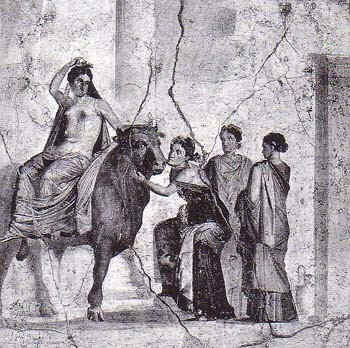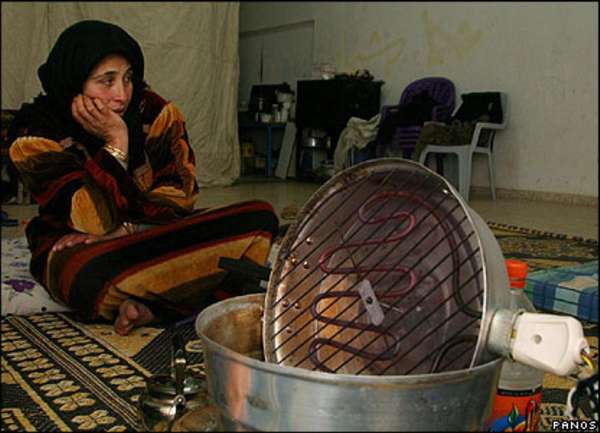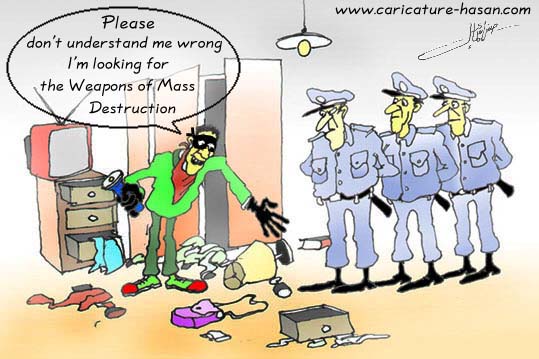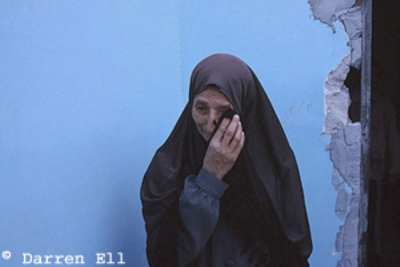
september 2004

.'Shoot them all'
Islamophobia and racism are alive and kicking inFrance, writes Salil Sarkar from Paris
http://weekly.ahram.org.eg/2004/700/in6.htm
France's Social Affairs Minister Jean-Luis Borloo pulls no punches. He pointed out that unemployment among the country's youth has risen from 15 to 22 per cent in the past 15 years. And in what the minister calls the "700 sensitive zones" -- suburbs housing immigrants and their descendants -- joblessness among the less-than- 25 year olds has skyrocketed from 25 to 55 per cent.
Meanwhile, racist attacks, the minister added, have shot up from 180 a year in 1999 to 800 today.
Racist attacks are real or imagined?
Africans and Arabs are often victims of police
repression, sometimes violent, but their sorry lot hardly
draws media attention. Instead, they are systematically
blamed for real or imagined anti- Semitic aggression.
Ministers, politicians, intellectuals all unite in
vociferous condemnation when a Jewish person or property
are targeted. On 9 July, a young non- Jewish woman lodged
a complaint to the police about being attacked. She
claimed she was robbed by six Africans and Arabs, in a
suburban morning train near Paris, who drew swastikas on
her belly.
In the wake of this incident, a verbal maelstrom of
insults and abuse were hurled at immigrants. "Nazis
from the suburbs" shrieked the pro-Israel League
Against Racism and Anti-semitism. Without checking facts,
French President Jacques Chirac expressed outrage at such
"anti-semitic" action, recommending severe
punishment. "For 13 minutes," wrote the Paris
daily Le Monde, "Marie was Jewish in the eyes of six
bad boys of African origin." "The Jewish
community lives in fear ... anti-Semitic aggression is on
the rise", chimed in Socialist Party bigwig
Ségolène Royal, a French presidential hopeful.
Barely two days after the alleged aggression, police
inquiry revealed that the complaint was pure fabrication.
No apologies were made to France's immigrant community,
with the exception of editorials in two dailies. Indeed,
raising anti-immigrant and pro-Israel hysteria is
becoming a national pastime among the elite.The
wonder is that, despite the racist tom-tom beating, the
average French person generally keeps a cool head,
displaying a maturity and tolerance rare among
decision-makers and the media. Take
former finance minister Dominique Strauss-Kahn, another
socialist hopeful for the country's top job. But for him
revelations that the "victim" had made up
violence stories to nail Arabs and Africans hardly takes
away from the fact that Jews in France are being attacked
20 times a week, by his extravagant count.
True, racially-motivated violence is on the rise, but
reliable numbers are hard to come by. France's national
Consultative Commission on Human Rights says there have
been more racist and anti-Jewish attacks in the first six
months of 2004 than in the whole of 2003.For the first
half of this year, says the Commission, there have been
207 racist attacks and 94 anti-Jewish aggressions against
128 and 47 respectively the previous year. Figures from
France's interior ministry do not tally: 95 racist
attacks and 135 anti-Semitic attacks in the first half
2003, as opposed to 92 and 127 all of last year. The
trouble is some of the complaints of anti- Jewish
violence or attacks on immigrants have proved fake. In
March 2003, a Jewish woman student falsely complained of
being assaulted by masked men calling her a "dirty
Jew" and carving a Star of David into her arm.In
December 2002, a 30-year old Tunisian was charged with
beating up ticket checkers in a Marseille bus, but had to
be released when the vehicle's internal video showed him
beaten up by transport officials instead.More recently in
Paris, it was revealed that a rabbi claiming to have been
stabbed by a man crying Allahu Akbar had mutilated
himself. Last year, a Talmudic school north of Paris was
burned to the ground provoking strident accusations of
anti-Semitism from commentators and politicians, but no
evidence of it was ever found. In another case, police
unmasked the head of the Zionist Federation of France who
was sending himself anti-Jewish messages as proof he was
being victimised.
Illicit
police repression:
These days in France, statistics of racist and
anti-Jewish violence are plentiful if suspect. But
beatings, arbitrary detention and torture at the hands of
the police are strangely absent from those lists.
France's best-informed paper, the satirical weekly Le
Canard Enchainé cites the very official Security Ethics
Commission, a body monitoring illegitimate police
violence. The commission notes that incidences of illicit
police repression has tripled between 2001 and 2003. The
commission's chair, veteran judge Pierre Truche expressed
surprise at the predominance of Africans and foreigners
among the victims.
 Le Canard
Enchainé commented: "that is another example of
tough repression unleashed against the
Le Canard
Enchainé commented: "that is another example of
tough repression unleashed against the
poor by former French police minister
Nicolas Sarkozy. Currently finance minister,
he is openly challenging his party elder, president
Jacques Chirac, for the country's top job.
Sarkozy, as finance minister, visited Washington DC, last
year to attend the World Bank group meetings. He found
time to lunch with virulently pro-Israel lobby groups,
received awards from them, and came back accusing
France's former Socialist-led government of not doing
enough to
battle anti-Semitism.
Lobby factions
There are around seven million French citizens and
permanent residents in France, who emigrated from the
country's former colonies. As for the French Jewish
community, they number about 400,000, many of whom
support the establishment of a Palestinian state and
fight for peace and justice in the Middle East. However,
a minority that hovers around the staunchly pro-Likud
Representative Council of Jewish Institutions (CRIF), has
been running a campaign for France to line up behind
Israel's government. The president of France-Israel,
retired amiral Michel Darmon says, "for the last 10
years, France's Jewish community has been fighting the
wrong battle". The enemy is not the far right, he
says, "but France's foreign policy", which he
and his friends deemed viciously anti-Israel. Writer and
philosopher Pierre André Taguieff has written a book
entitiled The New Judeophobia in which anti-capitalist
globalisation activists, left- wingers, anti-zionists and
Islamists are all lumped together in one bag as Jew
haters.
Do you all remember the murder of 12-year-old Mohammed
Durra by Israeli soldiers? This happened at the beginning
of the Second Intifada in the fall of 2002. The footage
of the boy's shooting was taken by a Palestinian
cameraman from France-2 TV, a channel headed in Israel by
Charles Enderlin. Swamped by tons of hate mail from
Zionists worldwide, Enderlin says, "some people have
been openly trying to get me sacked". Back in
France, prominent French geo-strategist Pascal Boniface
had to resign from the Socialist Party, for recommending
a more pacifist approach to the
Israel-Palestinian conflict.
In some sections of France's ruling class,
notwithstanding the government's brave stance on Iraq,
peace in Palestine remains a four-letter word. A few
years ago, French writer Michel Houellebecq had the main
character in his book Plateforme blurt out: "Every
time I learn of a Palestinian terrorist, a Palestinian
child, or a pregnant Palestinian woman, shot down by
bullets in the Gaza strip, I quiver with
enthusiasm". Vengeance (against Islam) does exist,
Houellebecq explained to the media shortly
afterwards................
The growing involvement of
American Jewish
groups in nascent pro-Israel lobbying efforts in
France:
...................is fueling concerns of a possible
backlash among some French Jewish leaders and Israeli
officials. In a letter to the Israeli Foreign Ministry
two months ago, Israel's ambassador to France, Nissim
Zvili, warned about the potential negative consequences
if American Jewish groups are perceived as seeking to
influence French politics, the Forward has
learned. Several French Jewish leaders are echoing
Zvili's concerns that any perception of American Jewish
money bankrolling politicians in France at a time when
anti-American and anti-Israel feelings are in vogue would
eventually harm French Jews.
Zvili, who was responding to a query from the Foreign
Ministry following news reports about such initiatives,
stressed the need to take into consideration the stark
differences of mentality and political structures between
France and the United States, according to a source at
the embassy. In his letter, Zvili also wrote that reports
of intervention by American groups are making French
Jewish leaders uncomfortable and could have a very
negative impact on public opinion.
Citing a commonly heard fear in French Jewish circles,
the embassy source said: "American Jewish money
funding a French electoral campaign would be a
catastrophe." Zvili, the source said, has urged
Israel to tell American Jewish groups to proceed
carefully. The source indicated that the message was
approved in Jerusalem and likely passed on to American
Jewish groups. Calls to the Foreign Ministry officials
overseeing the issue were not returned.
Much of the controversy has centered on an agreement
reached last year between the AJCongress and a vocal
pro-Israel group called the Union of French Jewish
Employers and Professionals, known by its French acronym,
UPJF. Concerns are also being voiced about the European
activities of the American Israel Public Affairs
Committee [AIPAC], the Washington pro-Israel lobbying
organization, which has developed ties with Jewish groups
in France and other European countries to encourage the
development of American-style lobbying. The American
Jewish Committee also has stepped up its role in Europe
in the past year, but it appears to have avoided the sort
of controversy surrounding the other two American groups.
Under the agreement between the AJCongress and UPJF, the
American group will provide its French partner with
advocacy training and advice, as well as financial
support. David Twersky, the director of the AJCongress's
newly formed Council for World Jewry, confirmed the
funding but declined to disclose its amount. So did Herve
Giaoui, UPJF's chairman.
The willingness of UPJF to support political candidates
and engage in political activism has triggered repeated
spats with the main French Jewish representative body,
known by its French acronym, CRIF. Roger Cukierman,
CRIF's president, has criticized the AJCongress's
agreement with UPJF. Now, UPJF's political activities are
fueling speculation in some circles that the new
agreement would bring the AJCongress into that arena.
"What you have here is a noxious mix of foreign
money, political lobbying and hawkish views," said
Patrick Klugman, the former head of the French Jewish
student union and a board member of CRIF. "This will
end up going against the interests of the Jewish
community." But both the AJCongress and UPJF
stressed that the cooperation agreement between the two
groups ruled out any role in French politics. Twersky
forcefully denied any suggestion that American Jewish
monies were being injected into French politics,
stressing that the agreement between the AJCongress and
UPJF explicitly rules out political action as part of
their shared activities and exclusively focuses on
efforts to fight antisemitism and anti-Israeli
perceptions. Giaoui said the American money would only
serve to finance pro-Israel advertising campaigns and,
therefore, he was not concerned about the potential
perception of American Jewish meddling in French affairs.
Twersky also stressed that UPJF was moving to empower
French Jews in a way that umbrella groups such as CRIF
could not. "Political action is deemed the sole
responsibility of UPJF," Twersky said, adding that
he advised the group not to take sides politically.
Examination of UPJF statements appears to show a pattern
of support for right-leaning candidates, reflecting what
numerous observers, including some officials of Israel's
Labor party, say is a greater sensitivity on the French
right than on the left to issues of antisemitism. In a
June 24 letter to its members detailing the group's
position on the issue of support to political candidates,
UPJF said it was "convinced that it is imperative to
become involved in the political life of our country, be
it at the local, national or European levels." The
June UPJF letter was meant to explain the organization's
decision to support the candidacy of Patrick Gaubert, a
well-known Jewish anti-racist leader, at a recent
European Parliament election, as well as that of Laurent
Dominati, in a French parliamentary election in Paris. In
addition, the group has expressed strong support for
presidential hopeful Nicolas Sarkozy. One of the group's
founders, Nicole Guedj, is now a junior minister in the
government. All four politicians are members of the
conservative UMP party of President Jacques Chirac.
Giaoui, the UPJF chairman, noted that the group also had
supported a communist candidate, as well as Francois
Zimeray, a Socialist former member of the European
Parliament who has taken strong pro-Israel stances.
However, he acknowledged that the group's tendency was
right leaning, adding that this was reflective of a
political shift in the Jewish community. Giaoui said the
group was openly encouraging Jews to donate funds to pro-
Israel candidates as a way for the Jewish community to
regain its political clout.
Observers noted that political financing in France is
curtailed severely by law, which only allows limited
donations by individuals, and that politicians tend to
spend less money than their American counterparts.
Moreover, the president charts the country's foreign
policy with very limited input from legislators,
rendering the funding of pro-Israel candidates at
parliamentary or local elections less useful. Despite
these obstacles to influencing government policy, UPJF's
willingness to endorse candidates and urge individuals to
fund them has struck a chord among a segment of French
Jews. "It is time for European Jewish communities to
take their responsibilities in terms of political action.
We have to accept to play a more political role,"
said Zimeray, the former European legislator who last
year set up his own pro-Israel advocacy group in
Brussels.
Zimeray said he would push such an agenda at CRIF, where
he was just appointed as the head of the political
committee. Other CRIF officials said the institution has
to remain neutral because of its position as the official
interlocutor between France's government and its Jewish
community. Zimeray's organization, called Medbridge, is
essentially trying to promote Israel's image by using its
network of relationships among European politicians.
Zimeray said he did not receive financial backing from
American Jewish groups but that he welcomed such
financing on specific projects. For instance, he received
some money from the AJCommittee for a trip that brought
more than 200 members of the European Parliament to
Israel and Jordan last year. However, in a clear allusion
to Aipac, he warned against replicating U.S. lobbying
models in Europe. "Some American Jewish groups just
behave as if Europe was not different," he said.
"This is just a recipe for a catastrophe."
Aipac has been actively building relationships with a
variety of Jewish organizations in Paris and in Brussels,
including another recently launched Brussels-based
pro-Israel advocacy group called the European Middle
East Forum, which was set up in 2002 by two French
businessmen, Marc Grossman and Ronny Bruckner. An
official with the European Middle East Forum said that
Aipac provided expertise but not financial support to the
new group. The official added that the group's funding
comes essentially from private European donors, although
"one or two" private American donors contribute
to its $2.2 million annual budget. "We absolutely do
not want to be the European arm of an American
organization," the official said, speaking on
condition of anonymity.
The official added that the new group, which recently has
opened branches in the six European countries with the
largest Jewish communities, was focused on issuing policy
memos and on organizing trips and meetings to improve
Israel's image in the eyes of European decision-makers.
The European Middle East Forum is encouraging its members
to support political candidates with, among other things,
financial donations, but is careful not to take positions
as an organization. "We are perceived as a Jewish
lobby. It doesn't go down well. but so be it," the
official said. [...]
Marc Perelman
"Israeli Envoy Vexed by Role Of U.S. Jews In
France"
The Forward (USA)
August 27, 2004
http://forward.com/main/article.php?ref=perelman200408251022

EU Says No Evidence PA Misused EU Funds
Reuters, Agence France Presse, Arab News
BRUSSELS, 11 August 2004
— The European Union’s anti-fraud office said
yesterday it had found no evidence that EU aid to the
Palestinian Authority has been used to finance illegal
activities such as terrorism.
“To date there is no evidence that funds from the non-targeted EU direct budget assistance to the Palestinian Authority have been used to finance illegal activities, including terrorism,” the European Union’s anti-fraud office OLAF said in a statement. OLAF said this was a preliminary assessment and that its investigation into the handling of such funds was continuing. “The investigation is ongoing and therefore every interim funding may be subject to review.”
The investigation, opened on Feb. 6, 2003, concerned allegations that EU funds had been misused to finance terrorism and on alleged irregularities in the fund allocation mechanism. OLAF has collected evidence from a number of different sources, including the International Monetary Fund and the World Bank. Both the Israeli administration and Palestinian Authority have cooperated with the probe. The EU is the biggest donor to the Palestinian Authority.
11/08/2004
OLAF Refutes Israeli Propaganda Campaign ‘No Evidence EU Funds to Palestinians Diverted to Terrorism’.........Palestine Media Center – PMC
Refuting a persistent Israeli propaganda campaign, the independent European Anti-Fraud Office, known as OLAF, said in a statement Tuesday that more than a year of investigation “to date” has turned up no evidence that EU funds to help run the Palestine National Authority (PNA) were diverted to terrorism or other illegal activities. “To date there is no evidence that funds from the non-targeted EU direct budget assistance to the Palestinian Authorities have been used to finance illegal activities, including terrorism,” OLAF said in a statement.
The EU stopped direct funding to the PNA at the end of 2002 after Israel alleged that non-targeted direct EU assistance to the Palestinians between late 2000 and 2002 was abused. The EU is the biggest donor to the PNA. Total aid to the Palestinians this year reached 250 million euros ($307 million), the European Commission said in July. The money is allocated through a World Bank trust which stipulates clear conditions to delivery of aid. A report from OLAF followed an 18-month investigation into Israeli allegations that EU funds “were misused to fund terrorism” and into the systems and control mechanisms operating within the direct budget assistance program. “This programme (like similar programmes of other donors) consisted of contributing directly to the general budget of the Palestinian Authority without linking the payments to specific kinds of expenditure,” the report said, according to www.eubusiness.com on Tuesday.
OLAF has collected evidence from a number of different sources,“representatives of third countries in the Middle East, audit firms and private sector sources, as well as some intelligence services of EU member states, who have a greater presence in the region.” “The OLAF investigators have also been in close co-operation with the Israeli administration and the Palestinian Authority. Several missions into the region have taken place and a number of documents have been provided by both sides,” it added. “Since investigations are ongoing, OLAF cannot comment on specific steps it may or may not take during its enquiries; neither is it possible for OLAF to estimate the expected duration of the investigation,” OLAF said.
A working group from the European
Parliament concluded in April that there was no proof to
link contributions of EU taxpayers with terrorism or
other illegal activities, Israeli daily Haaretz reported
Wednesday. The European Commission, which oversees the
aid, has always denied EU funds are used for illegal
purposes, noting that the International Monetary Fund
monitors the spending, AP reported Tuesday.

List of new commissioners and their portfolios
Austria: Benita Ferrero Waldner –
External Relations and Neighbourhood Policy
Belgium: Louis Michel – Development
and Humanitarian Aid
Cyprus Markos Kyprianou – Health
and Consumer Protection
Czech Republic: Vladimir Spidla –
Employment and Social Affairs
Denmark: Mariann Fischer Boel -
Agriculture
Estonia: Siim Kallas –
Administrative Affairs (Vice-president)
Finland: Olli Rehn - Enlargement
France: Jacques Barrot - Transport (Vice-president)
Germany: Günter Verheugen - Industry (Vice-president)
Greece: Stavros Dimas - Environment
Hungary: Laszlo Kovacs - Energy
Ireland: Charlie McCreevy –
Internal Market
Italy: Rocco Buttiglione – Justice,
Freedom and Security (Vice-president)
Latvia: Ingrida Udre – Taxation and
Customs Union
Lithuania: Dalia Grybauskaite - Budget
Luxembourg: Viviane Reding –
Information Society
Malta: Joe Borg - Fisheries and Maritime
Affairs
The Netherlands: Neelie Kroes -
Competition
Poland: Danuta Hübner - Regional Policy
Portugal: José Manuel Durão Barroso
– European Commission President
Slovakia: Jan Figel – Education,
Training and Culture
Slovenia: Janez Potocnik – Science
and Research
Spain: Joaquin Almunia – Economic
and Monetary Affairs
Sweden: Margot Wallström –
Institutional Relations, Communications Strategy (Vice-president)
United Kingdom: Peter Mandelson - Trade
UK Court of Appeal gives green light to torture
The International Secretariat of Amnesty International
AI Index: EUR 45/019/2004 12 August 2004
Amnesty International is appalled by today’s ruling of the Court of Appeal that "evidence" obtained by torture is admissible in the UK. "The rule of law and human rights have become casualties of the measures taken in the aftermath of 9/11. This judgement is an aberration, morally and legally," Amnesty International said today.
The Court of Appeal dismissed the appeals of 10 foreign nationals interned without charge or trial under the Anti-terrorism, Crime and Security Act 2001 (ATCSA). In a two-to-one ruling, the second highest court in England and Wales clarified that "evidence" obtained by torture would not be deemed admissible when directly procured by UK agents or in whose procurement UK agents have connived. "This caveat does nothing to prevent torture at the hands of agents of other states; in fact, it effectively encourages and fosters it. It is a fundamental duty of all courts to act as a bulwark against human rights violations. Today, the Court of Appeal has shamefully abdicated this most important duty," Amnesty International said.
The Court of Appeal dismissed all grounds on which the appellants had appealed against the October 2003 judgments of the Special Immigration Appeals Commission (SIAC), including SIAC’s ruling that torture "evidence" is admissible. "If there is sufficient evidence to warrant holding these individuals, they should be charged with a recognizably criminal offence, and tried in proceedings which fully meet international fair trial standards. Otherwise they should released", Amnesty International said.
Background
Under the ATCSA, the Secretary of State can certify non-deportable foreign nationals as "suspected international terrorists", and detain them indefinitely, without charge or trial. Therefore, Amnesty International believes that the ATCSA is discriminatory.
In December 2003, the Committee of Privy Counsellors, who had been charged with reviewing the ATCSA, recommended the urgent repeal of ATCSA powers allowing non-UK nationals to be detained potentially indefinitely. Early this month, the UK Parliament Joint Committee on Human Rights agreed with this recommendation.
As of today, 12 people remain interned under the ATCSA in the UK. They have been held in high-security facilities under severely restricted regimes. Most of the internees have been in detention for more than two years. One further person, known only as "G" for legal reasons has been granted bail under conditions amounting to house arrest. So far, only one person, known for legal reasons only as "M", has won an appeal against certification as a suspected international terrorist.
--- Further documentation ---
Amnesty International's report: UK: Justice Perverted under the Anti-terrorism, Crime and Security Act 2001- http://amnesty- news.c.topica.com/maacxmBaa86h4bfwXhbb/
Related Amnesty International press releases:
UK: Repeal emergency powers - http://amnesty-news.c.topica.com/maacxmBaa86h5bfwXhbb/
UK: Home Secretary's reported proposals -- an aberration of justice, the rule of law and human right - http://amnesty-news.c.topica.com/maacxmBaa86h6bfwXhbb/
UK: Scrap internment - http://amnesty-news.c.topica.com/maacxmBaa86h7bfwXhbb/
UK: Court of Appeal puts an end to M's persecution - http://amnesty-news.c.topica.com/maacxmBaa86h8bfwXhbb/
